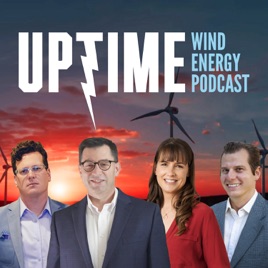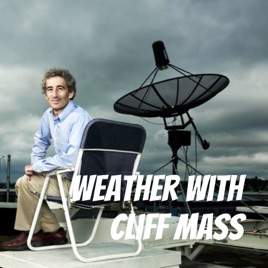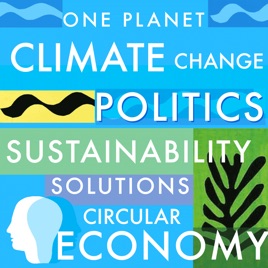
Advertise on podcast: Bionic Planet: Reversing Climate Change by Restoring Nature
Rating
5 from
Country
This podcast has
95 episodes
Language
Publisher
Explicit
No
Date created
2016/04/22
Average duration
35 min.
Release period
36 days
Description
We've entered a new epoch: the Anthropocene, and nothing is as it was. Not the trees, not the seas – not the forests, farms, or fields – and not the global economy that depends on all of these. What does this mean for your investments, your family's future, and the future of man? Each week, we dive into these issues to help you Navigate the New Reality.
Podcast episodes
Check latest episodes from Bionic Planet: Reversing Climate Change by Restoring Nature podcast
"Co" Benefits vs "Core Benefits:" Geoff Mwangi and His Theory of Change
2024/02/10
Remembering the Surui Forest Carbon Project, which was the first indigenous-led REDD project, plus:
A conversation with Geoffry Mwangi Wambungu, Chief Research Scientist at the Kasigau REDD Project in Kenya.
He explains what social scientists mean by “theory of change,” and tells us why he believes the term “co-benefits” is a misnomer in natural climate solutions.
Further reading on the Surui Carbon Project here: https://www.ecosystemmarketplace.com/articles/story-surui-forest-carbon-project/
Full Transcript (non-scripted portions translated by AI)
CO-BENEFITS VS CORE BENEFITS, WITH GEOFFREY MWANGI
Bionic Planet, Season 9, Episode 95
OPENING HOOK
STEVE ZWICK
Almir Surui was ten years old when the first logging truck came to his tiny village deep in the Amazon Forest.
It came to chop a single stand of centuries-old mahoganies, and it came with the grudging approval of the chiefs.
After all, they reasoned, it was just one truck, one stand, one time, and for a good cause.
The chiefs weren’t the grizzled old men you probably imagine. Most were barely into their 30s, because more than 90 percent of everyone had died in the five years before Almir was born in 1974.
Ninety Percent.
Gone.
They lost their mothers, their brothers, their sisters, and their lovers.
They lost almost everyone who knew anything about governance.
The surviving chiefs, shamans, and elders lost faith in their own abilities to serve their people, because their time-tested traditions had failed.
Prior to 1969, Brazilian authorities categorized Almir’s people as an “UNCONTACTED” tribe of the Amazon, but in reality, they HAD contact — SOMETIMES peaceful but MOSTLY violent contact — with neighboring tribes, rubber tappers, and even Brazilian explorers going back decades.
One of those neighboring tribes called Almir’s people the “Surui,” but Almir’s people called themselves the Paiter.
In the regional Tupi dialect, Surui means “enemy,” while Paiter means “real people.”
Due to a miscommunication, the Paiter were entered into the lexicon of indigenous people as “Surui” in the leadup to First Contact, which took place on October 7 1969.
Today, their name is hyphenated: Paiter-Surui.
The Paiter-Surui had lived in harmony with the forest for centuries, but they didn’t live in harmony with those who invaded their territory.
And invasions increased dramatically in the years prior to First Contact, as Brazilian authorities encouraged westward migration into the forest.
It was a bloody period, and the Paiter-Surui held their own in combat, but they couldn’t hold their own against European diseases — such as smallpox, measles, and the flu.
That’s what got them in the end.
The elders died, and kids became chiefs. One of those kids was a 17-year-old named Itabira, who learned to navigate the OUTside world of Brazilian society as the world IN-which he’d grown up disintegrated
(Aside)
By the way, if you can’t find any of this online, it’s because it’s all original reporting, and my book hasn’t been published yet.
Anyway, Itabira realized early on that to save his people, he had to push the Paiter-Surui and their struggle into Brazilian awareness. To do that, he and other chiefs stopped fighting illegal loggers and started colluding with them to finance trips to Brasilia, the capital of Brazil.
Soon, they were chopping trees to feed their families and pay for medicine, and by the mid-1990s, they were known as the “logging Indians” — despised by environmentalists who saw them as traitors to the cause and riven internally by fights over how to manage their resources.
The Paiter-Surui broadly split into three factions:
one that embraced the destruction of the forest for commercial gain,
one that opposed that destruction,
and one — the largest of them all — that WANTED to save the forest but NEEDED to feed their families.
Almir was born in 1974 — five years after First Cont
more
Zimbabwe's Cannabis Queen, Zorodzai Maroveke, AKA "Dr Zoey"
2024/01/11
Dr. Zorodzai Maroveke -- AKA "Dr. Zoey" -- heads the Zimbabwe Industrial Hemp Trust, which is promoting the uptake of industrial hemp as a climate smart alternative to wood, cotton, and plastic.
Hemp, she explains, replenishes faster than wood, uses far less water than cotton, and has almost no waste.
Its ecological benefits are clear, and she hopes carbon finance can be used to overcome the financial challenges to scaling up.
Supplemental Reading: "Commodities at a Glance: Special Issue on Industrial Hemp"
https://www.mycannabis.com/cannabis-in-zimbabwe-conversation-with-dr-maroveke/
more
Zimbabwe's Green Cheetahs, with Chiyedza Heri of the Ubuntu Alliance
2023/12/21
Zimbabwean entrepreneur Chiyedza Heri runs the Ubuntu Alliance, a company that's helping farmers leverage carbon finance to shift to more sustainable forms of agriculture.
She's one of more than a dozen young Africans I met at year-end climate talks in Dubai (COP 28) -- a new breed of entrepreneur that the late Ghanian economist George Ayittey calls "cheetahs" because they're nimble, quick, and hungry.
Green Cheetahs pursue activities that are pro-nature as well as pro-growth, and today's guest certainly fits that bill.
more
COP 28 Article 6: Expectations for Final Day
2023/12/11
With just one full day of negotiations remaining, Pedro Venzon and Andrea Bonzanni of the International Emissions Trading Association summarize the remaining issues under Article 6
Article 6 Update from Dubai with Kelley Hamrick Malvar of The Nature Conservancy
2023/12/08
Article 6 negotiations, which focus on international carbon markets, remain stalled in Dubai. Kelley Hamrick Malvar of The Nature Conservancy offers a look into the current state of play and the road ahead.
more
George Thumbi: Man of a Million Trees (5th Installment, "Carbon in Kenya")
2023/12/08
Kenyan agronomist George Thumbi is helping farmers in the region between Tsavo East and Tsavo West improve their yields and their soil by shifting to agroforestry and other forms of sustainable agriculture.
more
How Agroforestry is Reshaping the Kenyan Countryside
2023/08/09
This piece, adapted from a piece that first ran in 2016, serves as the fourth installment in our continuing series on carbon finance in Kenya. Today, we look at how carbon finance supports Sustainable Agriculture Land Management (SALM), which has doubled the average income of more than 30,000 Kenyan family farmers while pulling more than 1 million tons of carbon dioxide from the atmosphere by increasing the carbon content of soils.
more
The Gospel of REDD+ According to Bees
2023/05/25
In part three of our continuing series from Kenya, we hear how the Chyulu Hills REDD+ Project helped people switch from burning trees for charcoal to conserving forests -- the their benefit and the benefit of us all.
more
087 | How Ending Deforestation Revived a Major River, Slowed Climate Change, and Saved Lives
2023/05/01
Evans Maneno is Makueni County Ecosystem Conservator for the Kenya Forestry Service. He walks us through a tree nursery in the Chyulu Hills and explains how the Chyulu Hills REDD+ Project has reversed deforestation by helping people develop sustainable livelihoods -- reviving in the process a threatened river that provides water for people hundreds of miles away.
Second in a series
more
The Race to Save the Cloud Forests of Kenya's Chyulu Hills
2023/04/07
A decade ago, the cloud forests of Kenya's Chyulu Hills were on the brink of collapse, threatening water supplies for the Tsavo and Amboseli Plains — and for the coastal City of Mombasa, 250 kilometers away.
Then the Kenya Forestry and Wildlife Services teamed up with the Maasai Wilderness Conservation Trust, the Big Life Foundation, the Sheldrake Wildlife Trust, Conservation International, and, most importantly, grazing collectives, called “community group ranches” to launch the Chyulu Hills REDD+ Project — a thirty-year private-public partnership designed to save the hills by overhauling the rural economy.
First in a series focused on ecological restoration in southern and central Kenya.
more
Can Ghana Leverage REDD+ to Save its Cocoa Farmers? A conversation with Roselyn Fosuah Adjei of Ghana's Forestry Commission
2023/02/12
Ghana's cocoa economy is second only to Côte d'Ivoire's, but climate change threatens to decimate it. Today's guest, Roselyn Fosuah Adjei of the Ghana Forestry Commission, is charged with leveraging carbon finance -- and specifically REDD+ -- to avert that disaster.
more
084 | Treeless Neighborhoods and Poverty: the Deadly Link and How to Address it
2023/01/18
A 2021 study of trees in America showed that poor neighborhoods had far fewer trees than wealthier ones, and that translates into higher temperatures, poorer air, and more deaths. Jad Daley of American Forests explains the Tree Equity Score, what it means, and his organization's effort to plant -- and, more importantly, grow -- 522 million trees across American cities.
more
Podcast reviews
Read Bionic Planet: Reversing Climate Change by Restoring Nature podcast reviews
valdes-stefy
2022/10/23
What a great discovery
Fantastic podcast. Does a great job of synthesizing complex subjects for the non-scientist. Very relevant and current.
EnviroJean
2021/10/03
Great podcast!
Incredibly informative and timely.
robertbevandalton
2021/03/09
Great podcast to stay in front of the carbon tidal wave
Great episode, Steve! Thank you for providing this handy onramp for understanding voluntary carbon markets, and the urgency behind this massive effort...
more
heavily_meditated_mom
2020/07/28
Critical information made accessible
Thanks for your work. Always so informative.
wesmantooth82
2020/07/10
Quality Information
So great to have the science explained and interviews unpacking how to better understand the intersection of action, economy and ecology. Thank you fo...
more
DPalken
2020/02/13
Excellent, detail-oriented podcast
Steve Zwick has an in-depth knowledge of the problems and solutions in the climate space. He frames issues well, and routinely delivers accessible and...
more
ForesterPete
2018/02/20
Sober insights into the often murky and complex
Steve Zwick uses the 'convenient' podcast platform to demystify and offer sober insights into the often murky and complex world of international polic...
more
calaban koura
2018/01/13
Very well done
Interesting for both those in the world of climate policy like myself, as well as the average person interested to understand why goes on in this clim...
more
Lotteberlin
2017/11/17
Unbiased and fact-based climate reporting
Steve Zwick does a great job in navigating around bias and opinion and provides balanced and well-researched accounts on climate policy. The podcast i...
more
Dan_NH
2017/08/04
Compelling, substantive, enjoyable
Well worth listening to!
Podcast sponsorship advertising
Start advertising on Bionic Planet: Reversing Climate Change by Restoring Nature & sponsor relevant audience podcasts
You may also like these earth sciences Podcasts

4.6
58
200
Storm Front Freaks
Storm Front Freaks | Weather | Chasing | Tornado

4.6
33
295
The Uptime Wind Energy Podcast
Allen Hall, Rosemary Barnes, Joel Saxum & Phil Totaro

4.8
60
308
The Hydrogen Podcast
Paul Rodden

4.7
440
485
I Know Dino: The Big Dinosaur Podcast
Garret and Sabrina

4.8
237
130
Weather with Cliff Mass
Cliff Mass

5
7
101
Water Women
Water Women

5
55
301
Sustainability, Climate Change, Renewable Energy, Politics, Activism, Biodiversity, Carbon Footprint, Wildlife, Regenerative
Environmental Solutions · One Planet Podcast · Creative Process Original Series

4.4
27
1206
AccuWeather Daily
AccuWeather

5
8
50
Discovery to Recovery
Society of Economic Geologists

4.9
77
235
The Mineral Rights Podcast: Mineral Rights | Royalties | Oil and Gas | Matt Sands
Matt Sands



